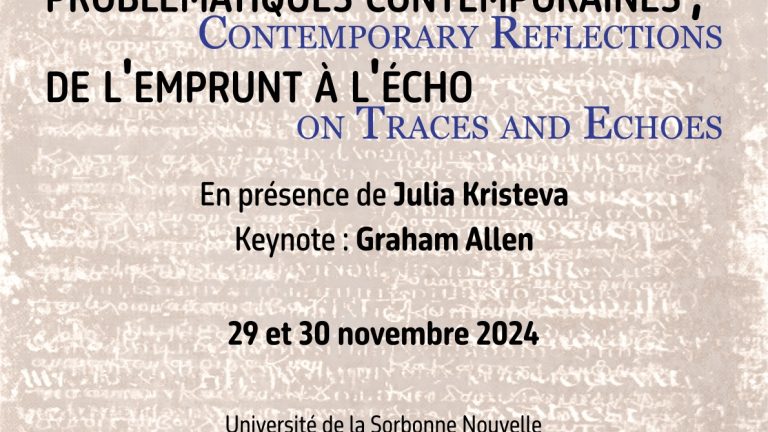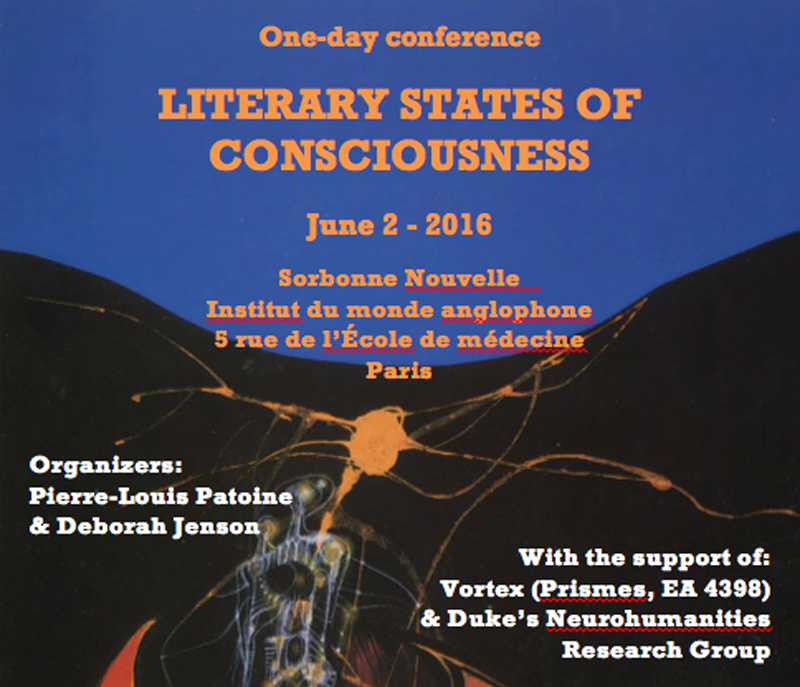Le colloque se tiendra à la Maison de la Recherche de la Sorbonne Nouvelle (4, rue des Irlandais – 75005 Paris), salle Athéna, les 29 et 30 novembre 2024.
Le conférencier plénier sera Graham Allen, et une table ronde aura lieu le samedi après-midi présence de Julia Kristeva.
Nous serons ravi·es de vous retrouver à cette occasion.
Le comité d’organisation : Yasna Bozkhova, Florian Bousquet, Béatrice Pire et Aliette Ventéjoux
Programme (téléchargeable ici)
Vendredi 29 septembre
Matin
9h30-11h – Panel 1 – Intervocalité / Intervocality
Richard Aldersley (NYU), “A Recurrent Chant”: The Lyric Ecology, Moral Economy, and Modernist Intertexts of a Fable
Martin George (Université Paris Cité), Performer l’intertexte burroughsien chez Laurie Anderson et John Giorno : vers une « intervocalité »
Jean-Philippe Heberlé (Université de Lorraine), De l’intertextualité dans Flight (1999) de Jonathan Dove et April De Angelis : de l’écho à l’emprunt
11h-11h30 Pause-café
11h30-12h30 – Panel 2 – Échos postcoloniaux / Postcolonial Echoes
Baptiste Rembert (Sorbonne Université), Queering Myth: Intertextual Dialogues of Desire and Identity in the Works of Anne Carson and Tommy Pico
Tianran Zhang (University of Amsterdam), Decolonising the Boudoir: Gender and Modernity in Ling Shuhua’s Ancient Melodies
12h30-14h30 Déjeuner
Après-midi
14h30-15h30 – Keynote
Graham Allen (University College Cork), The Anxiety of Choice: Constructing a History of Intertextuality (from Bloom to the Contemporary Digital Age)
15h30-16h30 – Panel 3 – Réécritures féministes / Feminist Rewriting Aurélie Le Formal (Université de Paris Nanterre), Des mots de l’autre subis aux maux de l’autre choisis : perspectives pragmatiques dans le roman autothéorique de Chris Kraus,
I Love Dick
Pauline Schwaller (Université de Lorraine), Déconstruire l’autorité d’Homère par la révision féministe : L’intertextualité dans The Penelopiad de Margaret Atwood et A Thousand Ships de Nathalie Haynes
16h30-17h00 Pause café
17h00-18h00 – Panel 4 – Hybridation interne/Internal Hybridization
Izabela Sobczak (University of Poznan), Intimate Intertextuality: Modernism in Contemporary Women’s Writing
Céline Malraux (Université de Lorraine), Nature de l’intertextualité entre l’analyse littéraire et la création littéraire dans une thèse en recherche – création : embranchements, croisements, écartements
Dîner
Samedi 30 septembre
Matin
9h30-10h30 – Panel 5 – Après Dante / After Dante
Hugh Deasy (Concordia University), Between Dante and Bacon: Intertextuality and Learning in Samuel Beckett’s The Unnamable
Sylvain Belluc (Université de Nîmes), Dante in the Delta: Oil, War, Environmental Destruction, and the Divine Comedy
10h30-11h Pause café
11h-12h30 Panel 6 – Empreintes modernistes / Modernist Traces
Kit Toda (Université de la Réunion), Fascist intertexts: Eliot’s Coriolan, Shakespeare’s Coriolanus and the Author as Text
Antoine Perret (Université Sorbonne-Nouvelle), T.S. Eliot Trendsetter, Jean Rhys Latecomer? Revisiting Good Morning, Midnight’s Modernism in Light of T.S. Eliot’s Poetry
Elsa Lorphelin (Sorbonne Université), Rewriting Rewritings: Intertextual Genealogies and Reception in a Postcolonial Context
12h30 – 14h30 Déjeuner libre
Après-midi
Table ronde – 14h30-16h
En présence et autour de Julia Kristeva (avec Nicolas Aude, Keren Mock et Marie-Christine Lala)
16h-16h30 Pause
16h30-18h – Panel 7 – Emprise / Hantise postmodernes / Postmodernist Influence / Haunting
Alwena Queillé (Sorbonne-Nouvelle), Bruits de fond : échos et déviations intertextuelles dans « White Noise » (2020) d’Emma Cline
Juliette Nicolini, Gilbert Sorrentino, troubadour clandestin : échos masqués dans les sonnets de The Orangery
Françoise Sammarcelli (Sorbonne Université), My Red Heaven de Lance Olsen – entre chambre aux échos et tableau hanté
18h Cocktail


